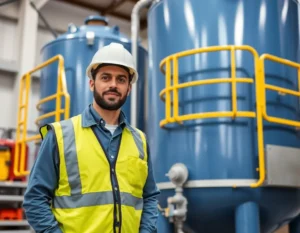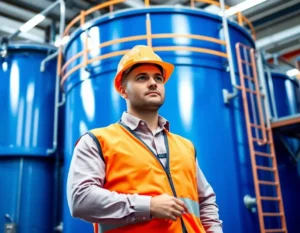When delving into the fascinating world of welding, one key question often arises: How many types of electrodes are there? This question is fundamental in the field of professional welding, since the choice of the right electrode can determine the quality and effectiveness of any project.
In this article, we will explore in detail How many types of electrodes are there? and we will discuss how each of them impacts precision manufacturing. Understanding the variety of electrodes available and knowing how to select the most suitable one is crucial to ensuring optimal results in your welding projects.
What are Electrodes in the Welding Field?
In the field of welding, electrodes are essential components that act as current conductors, allowing the generation of the electric arc necessary to melt the work material. This fusion process is what allows two metal pieces to be joined with great strength and durability.
Electrodes consist of a metal core and are often coated with a material that generates a protective gas during the welding process. This coating has several functions, such as protecting the weld from oxidation and stabilising the electric arc. The type of electrode used can significantly influence the quality of the weld, the ease of the process and the type of metal that can be welded.
How many types of electrodes are there?
When we ask ourselves How many types of electrodes are there?, it is important to understand that electrodes are classified according to different criteria, such as the type of coating, the core material and their specific application in welding.
- Coated Electrodes: These are the most common and are used in the manual metal arc welding (SMAW) process. The coating on these electrodes serves to protect the weld from air, stabilize the arc and facilitate the fusion of the metal.
- Tungsten Electrodes: Used in TIG welding (Gas Tungsten Arc Welding), these electrodes are not consumed during the process. Their main function is to maintain a stable electric arc while filler material is added separately.
- Continuous Wire Electrodes: These are used in MIG/MAG (Metal Inert Gas/Metal Active Gas) welding and are characterized by being made up of a wire that is fed continuously through the welding gun. The shielding gas is supplied externally to protect the welding area.
- Electrodes for Plasma Cutting: Although not used directly for welding, these electrodes are used in plasma cutting systems. They allow metals to be cut with high precision using a concentrated electric arc.
- Carbon Electrodes: They are mainly used in carbon arc welding processes and in cleaning metal surfaces. These electrodes generate a strong electric arc that is used to cut or grind metal.
Grasp How many types of electrodes are there? and its specific applications is essential to select the right electrode for each welding project. The correct choice not only ensures a strong and long-lasting joint, but also optimizes the efficiency of the process and the quality of the final result.
Electrode Selection Guide according to the Project
Selecting the right electrode is an essential step in ensuring the quality and efficiency of any welding project. Depending on the type of work you are performing, the material to be welded, and the specific environmental conditions, the choice of electrode can vary considerably.
When we ask ourselves How many types of electrodes are there?, we must bear in mind that each type offers particular advantages depending on the context. Below, we offer a practical guide to help you make the best decision:
- Welding Requirements: Consider the specific welding requirements, such as strength, ductility and final appearance. Depending on these needs, you can select the type of electrode that provides the desired mechanical properties and aesthetic finishes.
- Type of Material to be Welded: The material of the workpiece you wish to weld is the first factor to consider. The electrodes must be compatible with the base metal, whether it is steel, aluminum, stainless steel, or any other material. For example, to weld carbon steel, steel-coated electrodes are often used.
- Material Thickness: Material thickness directly influences electrode selection. For thinner materials, smaller diameter electrodes are recommended as they allow for greater control and lower risk of puncture. For thicker materials, larger diameter electrodes are preferred to ensure adequate penetration.
- Welding Position: The position in which the weld will be performed (flat, horizontal, vertical or overhead) also affects the choice of electrode. Some electrodes are specifically designed to work better in certain positions, offering greater control and better weld quality.
- Environmental Conditions: If the project is being carried out in an outdoor environment or under harsh conditions such as high humidity or extreme temperatures, it is crucial to choose electrodes that offer good performance under those circumstances. Electrodes with specific coatings can provide better protection against oxidation and moisture.
Do you need advice on selecting electrodes?
Choosing the right electrode is crucial to ensuring the success of your welding projects. Perez Precision Works,We have a team of experts ready to help you select the electrodes that best suit your specific needs.
Do you have questions about how many types of electrodes there are? and which one is best suited for your application? Please feel free to contact us. Our team is here to provide you with the guidance and support you need to optimize your welding process.
Factors to Consider When Choosing Electrodes
Choosing the right electrodes for your welding project depends not only on the type of material being joined, but also on a number of key factors that can influence the end result. When reflecting on How many types of electrodes are there?, it is also important to consider the following factors to ensure you choose the most suitable electrode:
- Type of Electric Current: Electrodes can be used with alternating current (AC), direct current (DC), or both. It is essential to know the type of current available on your welding equipment in order to select a compatible electrode. Some electrodes, such as tungsten, work best with direct current, while others are more versatile.
- Arc Penetration and Control: Some projects require greater arc penetration to achieve a strong, long-lasting weld, while others may require greater arc control to prevent burn-through or distortion. Different types of electrodes with different coatings can offer advantages in these areas.
- Deposition Rate: The rate at which filler metal is deposited during welding can affect both the efficiency of the process and the quality of the finish. For jobs requiring high productivity, it is important to select electrodes that offer a good deposition rate without compromising quality.
- Accessibility and Ease of Use: Consider the accessibility of the work area and the experience of the operator. Some types of electrodes are easier to handle and require less experience to achieve good results, which can be crucial on more complex projects or in tight spaces.
- Cost and Availability: Finally, the cost and availability of electrodes in your region may influence your choice. It is important to balance budget with electrode quality to ensure you are getting the best possible value for your project.
Impact of Electrode Type on Weld Quality
Impact of Electrode Type on Weld Quality
The type of electrode you choose for your welding project has a direct impact on the quality of the final work. When considering How many types of electrodes are there?, it is crucial to understand how each can influence different aspects of the welding process:
- Welding Resistance: Some electrodes offer higher mechanical strength, which is essential for jobs requiring a long-lasting and robust bond. For example, low-alloy steel electrodes are designed to provide high strength under demanding conditions.
- Surface Finish:The type of electrode also affects the surface finish of the weld. Electrodes with special coatings can reduce spatter and improve the appearance of the weld bead, which is especially important in jobs where aesthetics are a key factor.
- Ease of Use and Control: Some electrodes provide greater control during the welding process, allowing for more precise handling and reducing the chance of defects. This is vital for welds in tricky positions or on thinner materials.
- Material Compatibility: Choosing the right electrode ensures that the weld is compatible with the base material, avoiding problems such as cracks or inclusions. Each type of electrode is designed to work with certain materials, ensuring the integrity of the weld.
Understanding how How many types of electrodes are there? and its impact on welding quality will allow you to make informed decisions and obtain results that meet the highest quality standards.
Discover Our Professional Welding Services
Are you looking to ensure the highest quality in your projects? welding? In Perez Precision Works,We have a team of experts and a wide variety of electrodes to ensure that every job is done with precision and excellence.
Visit our page and explore the various options we offer. Whether you need precision welding For a complex project or advice on selecting the right electrode, we have the experience and technology to meet your expectations.



